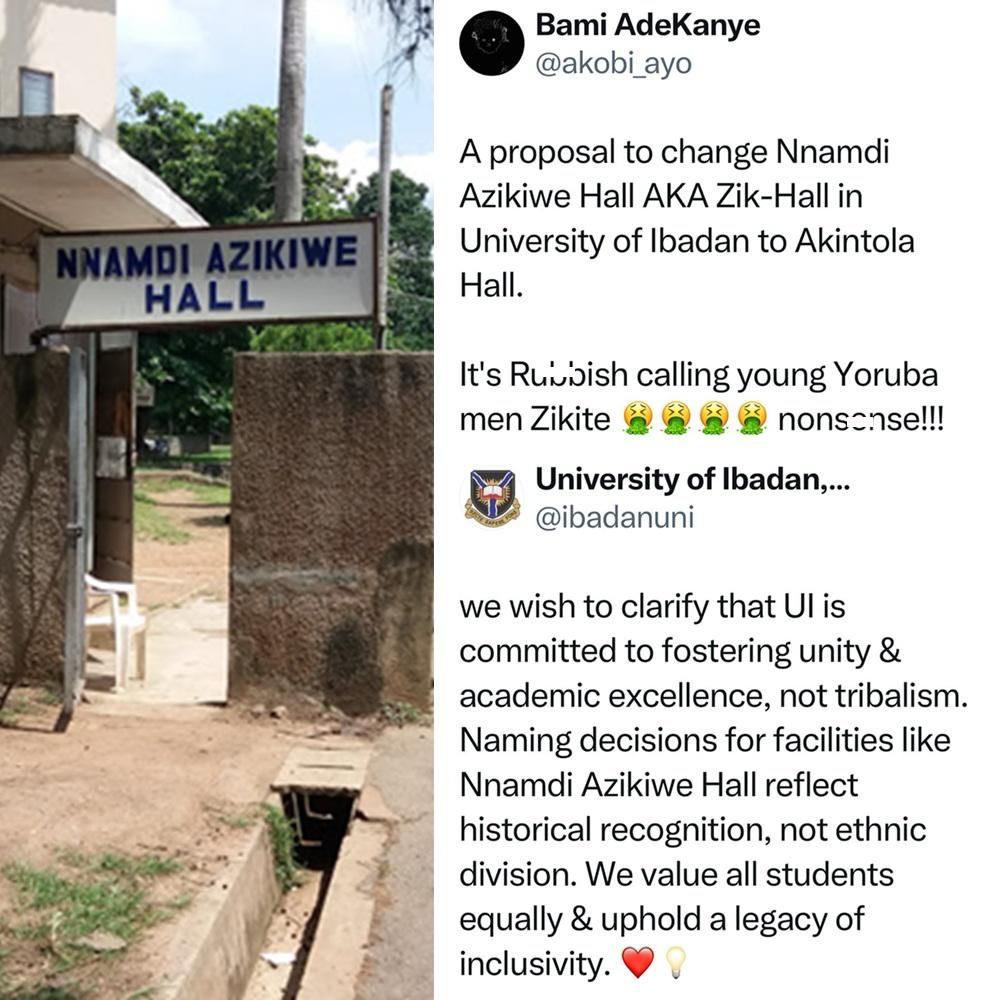
Controversy Erupts Over Proposed Renaming of Nnamdi Azikiwe Hall at UI

A heated debate has erupted on social media following a proposal to rename the prestigious Nnamdi Azikiwe Hall at the University of Ibadan to Akintola Hall. The proposal, which was first raised by a social media user, Bami AdeKanye, under the handle @akobi_ayo, has sparked strong reactions from students, alumni, and the general public, with many seeing it as an attempt to erase a significant part of Nigeria’s history and promote tribalism in an institution known for academic excellence and unity.
AdeKanye, in a tweet that quickly went viral, questioned the continued association of young Yoruba men with the name \'Zikite,\' a term used to describe students of the hall. He argued that it was illogical for Yoruba students to bear the identity of a historical figure who was not of Yoruba descent and suggested that the hall should instead be named after Chief Samuel Ladoke Akintola, a prominent Yoruba politician and former Premier of the Western Region.
His tweet read: \"A proposal to change Nnamdi Azikiwe Hall AKA Zik Hall in University of Ibadan to Akintola Hall. It’s rubbish calling young Yoruba men Zikite. Nonsense!!!\"
The statement immediately ignited a firestorm of reactions, with many Nigerians condemning the proposal as an unnecessary and divisive attempt to rewrite history. Others, however, saw merit in the suggestion, arguing that as a university located in the heart of Yorubaland, its prominent structures should reflect the region’s heroes and heritage.
Amidst the growing online discourse, the University of Ibadan was forced to address the controversy. The institution, through its official handle @ibadanuni, issued a response reaffirming its commitment to inclusivity and unity, dismissing any notion that it would entertain a renaming of the iconic hall based on ethnic considerations.
\"University of Ibadan wishes to clarify that UI is committed to fostering unity & academic excellence, not tribalism. Naming decisions for facilities like Nnamdi Azikiwe Hall reflect historical recognition, not ethnic division. We value all students equally & uphold a legacy of inclusivity,\" the tweet read.
The statement was widely praised by those who viewed the proposal as an attempt to sow division in one of Nigeria’s foremost institutions of higher learning. Many highlighted that Nnamdi Azikiwe, Nigeria’s first President, was not just an Igbo hero but a national figure who played a key role in the country’s fight for independence.
Critics of the renaming proposal pointed out that Azikiwe was instrumental in the establishment of the University of Ibadan and played a significant role in shaping Nigeria’s early educational landscape. The naming of the hall in his honor was a recognition of his contributions to Nigeria as a whole, not an endorsement of any ethnic superiority.
Several prominent voices weighed in on the matter, emphasizing that Nigeria\'s history cannot be rewritten based on tribal sentiments. Social commentator and historian, Dr. Adewale Fasanya, remarked: \"Nnamdi Azikiwe was a nationalist who fought for Nigeria, not just the Igbo people. The University of Ibadan was built for the nation, and his contributions deserve to be recognized. This attempt to create unnecessary divisions must be discouraged.\"
However, some voices in support of the renaming argued that Chief Samuel Ladoke Akintola, a Yoruba leader who made immense contributions to Western Nigeria, deserved similar recognition. They contended that while Azikiwe was an important figure, there was no reason why a leading Yoruba institution could not honor a Yoruba hero in the same way.
Amidst the controversy, former students of Nnamdi Azikiwe Hall, fondly called ‘Zikites,’ took to social media to defend their identity and the legacy of their hall. Many alumni, spanning different ethnic backgrounds, emphasized that being a Zikite was not about ethnicity but about embodying the ideals of leadership, courage, and academic excellence that Nnamdi Azikiwe represented.
One such alumnus, identified as @OluwaFemi, tweeted: \"I am a proud Zikite. This hall stands for resilience, brotherhood, and leadership. Azikiwe was a nationalist, not a tribalist. Anyone who has lived in Zik Hall knows that we do not think in ethnic lines. This renaming proposal is unnecessary.\"
Others noted that if the argument for regional representation were to be taken seriously, then many other structures in Nigerian universities would have to be renamed, which would only serve to deepen ethnic divisions rather than foster unity.
The debate over renaming university halls and other national landmarks is not new in Nigeria. In the past, similar discussions have arisen over statues, street names, and public institutions, often reflecting the deep ethnic and political divisions in the country. However, most of these debates have ended in the preservation of historical names, as institutions and policymakers often prioritize national unity over regional sentiments.
For now, the University of Ibadan’s firm stance on the matter appears to have quelled the controversy, but the conversation it sparked has left lingering questions about the role of history and ethnicity in Nigeria’s educational institutions. While some believe that every ethnic group should be given equal recognition, others argue that national figures should remain honored regardless of their ethnic origin.
The Nnamdi Azikiwe Hall remains one of the most revered halls of residence at the University of Ibadan, with a long-standing tradition of activism and leadership. For many students, past and present, the hall’s name is more than just a tribute to a historical figure; it is a symbol of strength, unity, and intellectual excellence that transcends ethnic lines.
As the dust settles, it is clear that this debate has once again highlighted the complexities of Nigeria’s multicultural society and the importance of maintaining historical legacies that unite rather than divide. Whether or not such discussions resurface in the future, the University of Ibadan has made it clear that its priority remains academic excellence, unity, and inclusivity—principles that Nnamdi Azikiwe himself championed throughout his life.


